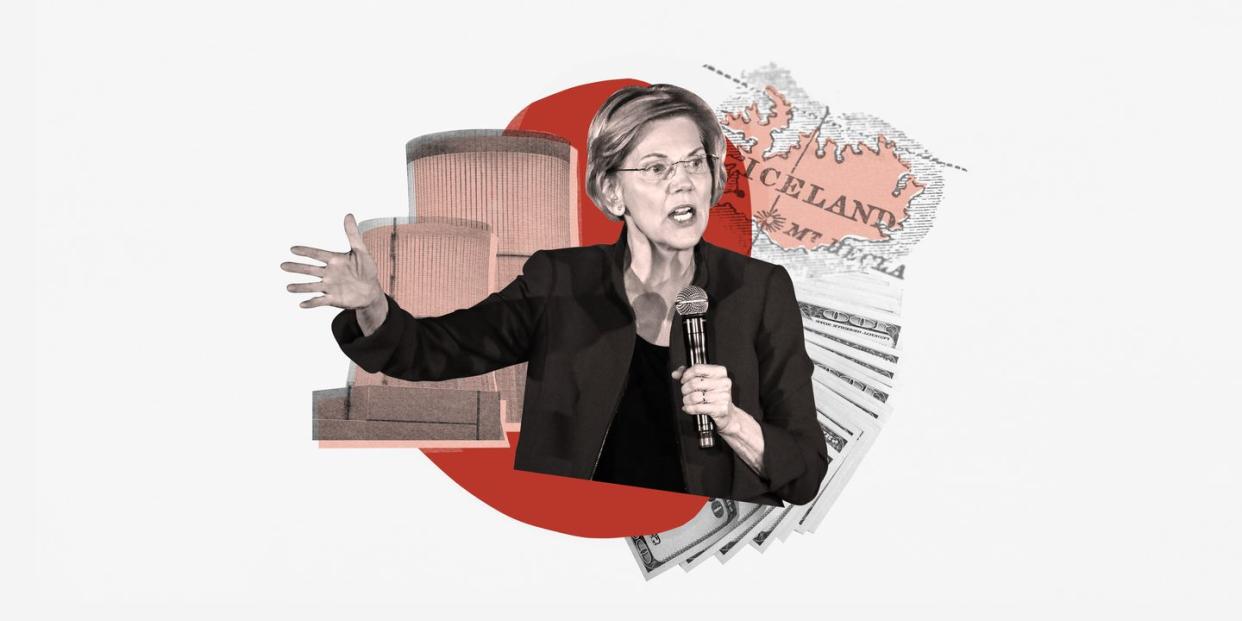"Progressive Ideas" in Democratic Debates Aren't Actually Progressive

One of the most exquisitely memorable moments of the past two nights of Democratic debates came when Senator Elizabeth Warren turned to former Maryland Congressman John Delaney, after he claimed Democrats couldn’t run on “fairy-tale economics,” and declared, “You know, I don’t understand why anybody goes to all the trouble of running for president of the United States just to talk about what we really can’t do and shouldn’t fight for.”
People loved it so much that Delaney’s Wikipedia page was quickly edited to announced that he’d died at the hands of Warren at the debates.
At the far other end of the podium, Marianne Williamson was similarly discussing her positive outlook. The candidate was the most searched during the debate, and GOP pollster Frank Luntz claimed, “She’s cutting through the clutter tonight.” Donald Trump Jr. was a fan, claiming she won both nights.
The black women sitting next to me were screaming @MarWilliamson’s praises during her answer about reparations.
She’s cutting through the clutter tonight. #DemDebate pic.twitter.com/uYNlzfH5GV— Frank Luntz (@FrankLuntz) July 31, 2019
I think Marianne Williamson won tonight’s debate too. #DemDebate
— Donald Trump Jr. (@DonaldJTrumpJr) August 1, 2019
Williamson certainly has big ideas: She appears to believe that positive thinking is more powerful than nuclear radiation.
Still, according to Frank Bruni’s New York Times column, Warren is the one on “fantasy island.”
He wrote that the other candidates portrayed Warren and Sanders as “fantasists peddling policies—single-payer health care, the decriminalization of illegal border crossings, the elimination of all or most college debt.”
I wish they would call “fantasy island” by its proper name: Iceland.
Iceland is a country that, at least, allows for universal health care and free higher education at state schools.
You could say something similar of two other other islands, Australia and New Zealand.
In New Zealand, prime minister Jacinda Ardern has pledged to introduce three years of free college education by 2024. And while tuition isn’t free in Australia (though it was until 1989), college debt doesn’t present the same problem, and students generally don’t worry they’ll be saddled with debt they can’t afford. Student loans are interest free and deducted from earnings only once the former student is making at least $39,000 a year. At which point, 4 percent is deducted from their paycheck.
In America, student loan companies begin collecting from anyone who makes $18,000 at a rate that varies from 10 to 20 percent. There’s also interest on those loans. Now, the United States has had a system like Australia’s on the books since 1994, but somehow we never got around to implementing it effectively.
We could look to that other fantasy island, Britain, where a National Health Service (NHS) is so uncontroversial that it appeals not only to expats, but to people who thought that Brexit would help add funds to the NHS.
As for the other progressive idea: The Green New Deal often gets dismissed as a progressive “fantasy.” But it’s hard to call it a fantasy when China is already plunging trillions into renewable energy and looking into building a solar energy plant in space. In better times, this is the kind of technology race we’d be competing with them on. As it is, Donald Trump says—in spite of 97 percent of scientists agreeing that climate change is real and man-made—that climate change is a hoax invented by the Chinese. Given their current actions, it certainly is an expensive hoax for them to be playing on themselves.
A good way to gauge whether or not a policy idea is mere pie-in-the-sky fantasy is to ask yourself, “Does basically every other developed country have this?”
Places that provide health care, good climate change policies, and affordable higher education? Yeah, there are a ton of places that do that.
Because the terrible things in America, like the scourge of gun violence, do not happen in other countries the way they happen here. And one of the tragedies of American exceptionalism is the continued reiteration that the United States is the greatest country in the world.
You should ask, well, at what? Because if we confront the grim reality of the situation, most other countries are providing better value to their citizens than the tax dollars we’re willing to put into endless wars.
The ideas progressives are talking about seem big only in America. In the rest of the developed world, they seem pretty normal.
What might end up being the truly dangerous fantasy is the idea that we don’t need to do anything to catch up to them.
You Might Also Like

